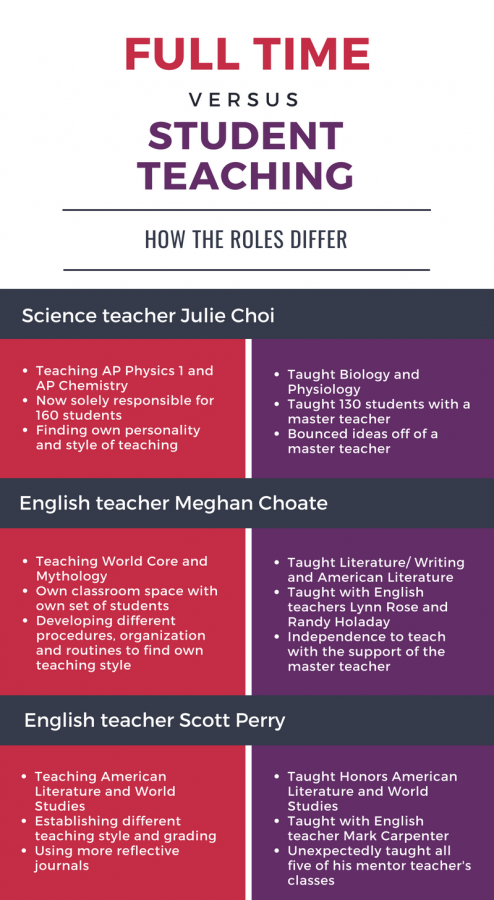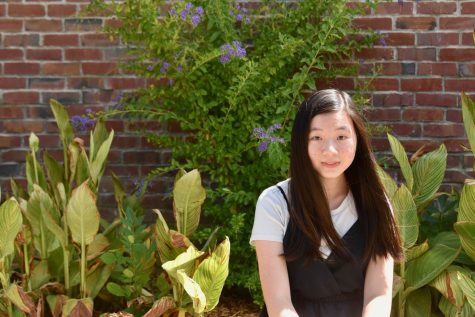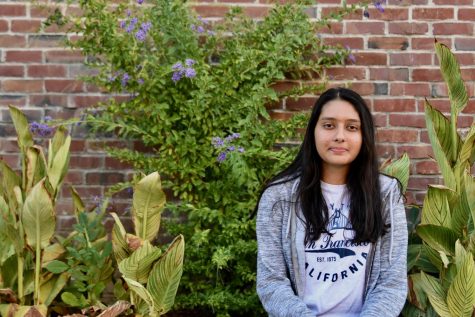Stepping up to the front of the classroom
Student teachers transition to full-time roles in the new school year
August 23, 2018
Science teacher Julie Choi stands at the front of her new classroom, surveying the space. The classroom is still a work in progress. Cardboard boxes filled with posters and photos are stacked around. Stools are spread out around desks. Choi imagines the classroom nine years ago when she was an MVHS student; however, both MVHS and Choi have grown since then. And as Choi opens another box, she hopes that they both can grow a little more — together.
Choi graduated from MVHS in 2009 but decided to return as a science teacher. For the past year, she has been a student teacher in biology teacher Pooya Hajjarian’s classroom. This year is Choi’s first as a full-time teacher, and she will be teaching AP Physics 1 and one period of AP Chemistry. Since Choi attended MVHS, she believes she may be able to alleviate the students’ stress, especially since she experienced it first-hand for four years.
“I know [about] the academic stress and the things students are going through,” Choi said. “I felt like I could bring something to the community because I could understand their feelings. It always motivated me to do better.”

While Choi is looking forward to her return, she is also nervous. She explains that starting as a full-time teacher is a sharp jump from student teaching, as she is now solely responsible for 160 students. Despite feeling honored to be trusted with so many students, Choi also finds the prospect of supporting so many individuals daunting, as their struggles always feel like a weight on her shoulders.
“I was involved first semester with Mr. Hajjarian’s classes,” Choi said. “[But] even then, when students came in with struggles, I feel like I took those struggles with me, I felt it.”
English teacher Meghan Choate believes that the most difficult aspect of transitioning from a student teacher to a full-time teacher is losing the mentor teacher’s support and guidance. Choate was previously a student teacher for English teacher Lynn Rose and is now teaching World Core and Mythology.
“The biggest transition is moving from sharing students and a classroom with a master teacher [to being] in my own classroom space [with] my own set of students,” Choate said. “It’s exciting because it allows me to find my groove.”
Choate is aware that she will make mistakes. However, she believes that the important thing is to accept her mistakes and not be overly critical of herself, as she has a lot to learn and discover. She understand that it will take her a trial-and-error period to find a steady footing in the classroom.
“My goals include being kind with myself and understanding that this is my first year,” Choate said. “[I want to be] forgiving [to myself if] anything [doesn’t] go the way I expect. [I want to] continue building my own personality as a teacher in the classroom. ”
Although she’s excited about teaching full-time, Choate says she’ll miss having Rose’s wealth of experience to guide her. Rose helped her make seamless lesson plans and advised her on technology usage. Choate explains that it will be difficult for her to create her own plans without this second opinion.
“My favorite aspect [of student teaching] was having the support of my master teacher with me,” Choate said. “It gave me the independence to teach classes while also having someone there who knew the students and the content and somebody who was there to offer me feedback.”
On the other hand, English teacher Scott Perry is excited to make his own decisions and run his classes the way he desires. He student-taught in English teacher Mark Carpenter’s class and is teaching American Literature and World Studies this year. He is excited to have more freedom with his teaching tactics.
“I think [the year] will go really well,” Perry said. “It will be fun just to be out on my own and make my own decisions. It’s always different when you’re a student teacher because you always need supervision. [Sometimes], I couldn’t grade the way I wanted to grade.”
While Perry is eager to make his own teaching decisions, he also wants to incorporate some strategies that Carpenter used into his classes. For example, he liked Carpenter’s tactic of “converging, then diverging,” where students discuss a topic as a class, then individually reflect on the topic of discussion. Similarly, Choate wants to weave some of Rose’s teaching strategies into her own lesson plans, such as the way Rose facilitates meaningful class discussions.
Choi echoes a similar sentiment, explaining that she always admired Hajjarian’s ability to create a lighthearted classroom atmosphere that was both playful and productive. She hopes to bring the same element of liveliness to her classes but thinks it will take her time to learn how to keep students both laughing and focused.
“[Hajjarian’s] definitely all about having fun with learning,” Choi said. “[He believes] that learning can be fun. I think I’m a believer in that too. I’m not sure how much of that I can bring in my first year because I’ll be learning the ropes this year.”
After observing the way Hajjarian interacts with his students on a personal level, Choi also decided she wants mimic the same interactions in her AP classes. She noted in her own years at MVHS that advanced classes often lack this element of student-teacher connection. Choi doesn’t understand why a more challenging course should be less personalized — she believes that that if anything, the faster pace of the course demands more personalized interaction.
“I felt like as a student, when I was doing AP classes, it was all about academics,” Choi said. “I think academics is very important, no doubt, but I also want to connect with these kids and make sure nobody is falling behind or feeling like they are stupid because they didn’t understand something that another kid did.”
Like Choi, Perry also wants to keep improving his classes in order to make his students’ classroom experience the best possible. He believes that if teachers don’t adapt their courses to fit their students’ needs, the students won’t be able to reach their full potential.
“Teaching is always exciting,” Perry said. “You never think ‘I did this last year.’ You’re always changing things up. To see from August to June, how the students and I grew together, that’s what I’m excited for. It’s not even so much what we learn, it’s more the experience.”
Additional reporting by Shivani Gupta and Laasya Koduru.














